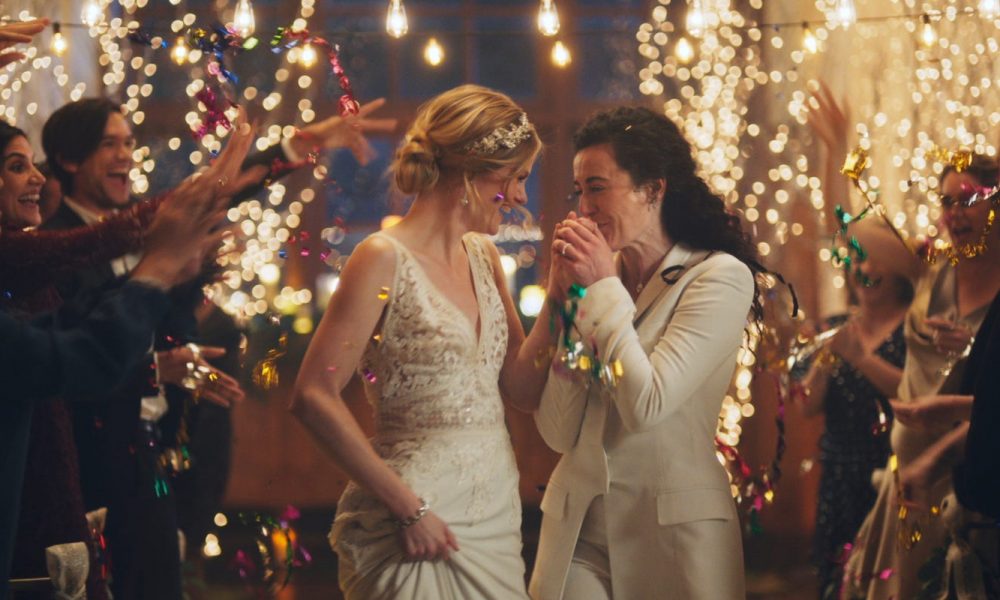Workplace discrimination
Steven Petrow, Opinion columnist
Published 12:29 p.m. ET Dec. 16, 2019 | Updated 12:38 p.m. ET Dec. 16, 2019
Workplace discrimination I’m a sucker for those sappy, unrealistic, woefully undiverse Hallmark Channel Christmas movies. Thankfully, queer couples finally make an appearance.
“Mistakes are a fact of life. It is the response to error that counts,” wrote poet Nikki Giovanni. She might as well have been writing about the recent mess at the Hallmark Channel, which in the past two months zigzagged from promises to be more inclusive of LGBTQ families on its TV channel (there are none currently), to yanking four commercials featuring two brides (calling them “controversial”), to completely reversing course this weekend and apologizing to Zola, the wedding planner company that had produced the ads. The president and CEO of Hallmark Cards, Inc., said the earlier action to ban the ads featuring lesbian brides “was the wrong decision.”
Good for Hallmark. And good for viewers.
I confess: One of my guilty pleasures is watching the Hallmark Channel’s Christmas movies, especially the royal fantasia “Crown for Christmas.” Schmaltzy? Check. Unrealistic? Of course. Inclusive? Hardly. The lack of representation of queer people has been only one part of the Hallmark Channel’s failed diversity efforts, which unfailingly presents “white Christmas” storylines, which is to say very few African Americans or other people of color in starring roles.
Workplace discrimination A white, straight Christmas
As an example, take the two-dozen holiday movies that Hallmark is debuting this month as part of its annual “Countdown to Christmas.” “None center on a same-sex couple or feature LGBTQ characters,” reported LGBTQ news website The Advocate. Fortunately, that failure to represent queer couples and families appeared to be coming to an end when the CEO of Crown Media Family Networks, the Hallmark Channel’s parent company, told The Hollywood Reporter in November they are “open” to any type of movie, including with gay leading characters.
It was a blessing to honor God at work: Chick-fil-A once inspired me to live out my faith in the workplace. Those days are gone.
After all, it’s nearly 2020. There are more than half a million same-sex married couples in the United States, now that gay marriage is legal in every state in the union.
Not coincidentally, before the Zola ads were pulled, the advocacy group One Million Moms, which is a part of the religiously conservative American Family Association and defines part of its mission as the “fight against indecency,” hosted a petition on its site that urged Hallmark to “reconsider airing commercials with same-sex couples, and please do not add LGBT movies to the Hallmark Channel. Such content goes against Christian and conservative values that are important to your primary audience. You will lose viewers if you cave to the LGBT agenda.”
(As of Monday, the petition had only 30,000 names, while One Million Moms has just about 97,500 “likes” on Facebook.)
Wait, wait — there’s a gay agenda lurking within wedding planning ads? The only agenda I could find was a commercial one: The brides’ guests would have arrived on time and purchased them nicer gifts if they’d used Zola, which brands itself as “the home of all things wedding.”
A Hallmark Channel spokesman told the New York Times that the brides’ “public displays of affection”— a typical lips-together smooch — were in violation of its policies. Well, that PDA policy wasn’t uniformly applied, since the channel had approved two Zola commercials and, in one of them, the heterosexual couple kissed, too.
Workplace discrimination A kiss is a kiss is a kiss
As I wrote in my book about LGBTQ etiquette: The acceptability of public displays of affection is about location, not sexual orientation. In other words, where you are (a club versus a church, the movies or the family dining room) and not who you are (a same-sex or opposite-sex couple).
To paraphrase Gertrude Stein: A kiss is a kiss is a kiss.
Do LGBTQ people still need to make the argument that we are families, too? That we are part of the fabric of American life, even as the Trump administration erases equal protections for members of our community? A Zola spokesman nailed it when he said, “All kisses, couples and marriages are equal celebrations of love.”
Discrimination is far from dead: Obergefell: Supreme Court, lawmakers have more to do to prevent anti-LGBTQ discrimination
Zola was joined by an outpouring of support from the LGBTQ community and celebrities, with the Twitter hashtags #BoycottHallmark trending at one point over the weekend. Ellen DeGeneres and Sandra Bernhard, who played an openly bisexual character on “Roseann,” also weighed in with Bernhard tweeting: “All the groovy gay ladies i know won’t be watching your Christmas schlock.”
On “Saturday Night Live” the Hallmark decision was mocked, and Netflix U.S., a Hallmark competitor, tweeted images from a TV show and film labeled “Titles Featuring Lesbians Joyfully Existing And Also It’s Christmas Can We Just Let People Love Who They Love.”
Finally, on Sunday, Hallmark Cards, Inc., did the right thing, with its president and CEO saying the network would reinstate the Zola ads and stand up for diversity: “Our mission is rooted in helping all people connect, celebrate traditions and be inspired to capture meaningful moments in their lives. Anything that distracts from this purpose is not who we are. We are truly sorry for the hurt and disappointment this has caused.”
Thank you, Hallmark.
Meanwhile, the One Million Moms website lists a number of active campaigns critical of the supposed “LGBTQ agenda.” Sure, you can try to erase us everywhere. But don’t forget: We are here. We get married. And for now we’ll watch sappy Christmas movies on Netflix and, yes, Hallmark.
Steven Petrow is a member of USA TODAY’s Board of Contributors and the author of five books on etiquette. Follow him on Twitter: @StevenPetrow or like him on Facebook at facebook.com/stevenpetrow.
Autoplay
Show Thumbnails
Show Captions
Read or Share this story: https://www.usatoday.com/story/opinion/voices/2019/12/16/hallmark-gay-couple-kissing-zola-commercial-column/2663110001/
